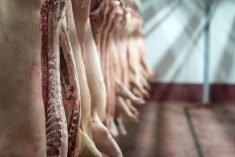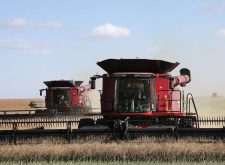Canola futures dipped on Thursday in light trade.
There was no market changing news.
Canola remains under pressure from a bit of a slow down in demand and prospects for a record South American soybean crop.
• As we have reported over the past few months Argentina had soggy wather during its wheat growing season and that hurt production.
Today the government dropped its wheat crop forecast to 11.1 million tonnes from 11.5 million previously.
USDA’s current forcast is 11.5 million tonnes. Last year it produced 15.5 million.
Read Also

U.S. grains: Soybeans rise on China demand hopes; corn and wheat rebound
Chicago Board of Trade soybean, corn and wheat futures rose on Monday on signs of progress towards the end of a record-long U.S. government shutdown, along with expectations of a revival of U.S. soybean exports to China, analysts said.
• In another report, the Buenos Aires Grains Exchange said 36.6 percent of the expected soybean crop has been seeded. A few days of dry weather recently has helped push ahead progress, but seeding remains about 10 percentage points behind last year’s progress at this point. Corn seeding is also behind.
Heavy rain is forcast to hit Argentina’s agricultural zones again at the end of November.
• Malaysian palm product exports for the first 20 days of November edged lower from a month ago. The decline was minor but added to continuing concern around slack demand and rising monthly stocks.
• Reuters reports that ongoing wheat harvest results in Australia confirm a problem with protein. Analysts say a below average protein crop is expected. The size of the crop is also down from last year’s record. The state of Western Australia, the largest producer, suffered from lack of rain and so production forecasts were downgraded but grain handler CBH Group said results so far indicate the harvest will likely be at the upper range of the reduced outlook.
• European countries are battling over a seven year spending plan, that might wind up making the first real cuts ever to agricultural spending.
Britain, Germany Sweden and the Netherlands insist on budget reductions, including cuts to the Common Agriculture Policy, or CAP.
France, Italy Spain, Poland and some eastern European countries are trying to resist deep cuts.
CAP consumes 40 percent of the EU budget.
The current budget framework agreed in 2005 covered 2007-13 and set a maximum limit of 1.034 trillion euros.
For the 2014-2020 period, the Commission initially sought a five percent increase but that was rejected and now they are talking about a 1.01 trillion euro budget, but that might have to dip below the trillion euro mark in the final reckoning.
German Chancellor Angela Merkel said it might not be possible to reach an agreement this week and the final round of negotiations might be early next year.
Winnipeg (per tonne)
Canola Jan 13 $578.40, down $0.80 -0.14%
Canola Mar 13 $576.00, down $0.80 -0.14%
Canola May 13 $575.00, down $0.30 -0.05%
Canola Jul 13 $572.00, down $0.10 -0.02%
Milling Wheat Dec 12 $297.30, unchanged
Milling Wheat Mar 13 $306.80, unchanged
Milling Wheat May 13 $309.80, unchanged
Durum Wheat Dec 12 $312.00, unchanged
Durum Wheat Mar 13 $318.60, unchanged
Durum Wheat May 13 $322.60, unchanged
Barley Dec 12 $250.00, unchanged
Barley Mar 13 $253.00, unchanged
Barley May 13 $254.00, unchanged
American grain markets were closed for Thanksgiving.
The Bank of Canada noon rate for the loonie edged higher to $1.0026, up from $1.0020 the day before.
The U.S. greenback was 99.74 centts Cdn.
New York crude did not trade today.
Bent crude fell 31 cents to $110.55 per barrel.
The Toronto Stock Exchange’s S&P/TSX composite index rose 53.04 points, or 0.44 percent, to close at 12,153.10.
RIM shares rose 17 percent on hopes that its new Blackberry phone due January will be a success.














